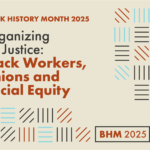
This Collective Bargaining Rights Day, Unions Celebrate Wins for All Workers
Canada’s unions are recognizing June 8 as Collective Bargaining Rights Day by celebrating the labour movement’s long and proud history of winning important gains at the bargaining table, a legacy that improves the economic realities for all Canadian workers and their families.
“Collective bargaining allows working people to take part in fundamental decisions affecting their lives and, through collective action, improve conditions and prospects for their families, instead of forcing a race to the bottom,” said CLC President Hassan Yussuff. “All workers should be able to exercise the fundamental right to a collective voice in their workplace.”
Collective bargaining allows working people to come together through labour unions to have a say on wages and working conditions, providing a counterbalance to corporate power. Through collective bargaining, working people in unions have negotiated higher wages, better benefits and safer workplaces. It is also the best means for raising wages and conditions for all workers in Canada.
The freedom to form and join a union is core to the United Nations Universal Declaration on Human Rights and is an “enabling” right—a fundamental right that ensures the ability to protect other rights. Canada ratified the International Labour Organization (ILO) Convention 87 on Freedom of Association and Protection of the Right to Organise in 1972, and in 2017, Canada ratified ILO Convention 98 recognizing the Right to Organise and Collective Bargaining.
However, one of most significant gains came in 2015 when Canada’s highest court fully recognized labour rights in Canada through two judgements that have been broadly interpreted to mean that collective bargaining is constitutionally protected by the Charter guarantee of freedom of association. Through its rulings, the Supreme Court of Canada told Canadians, employers and government not only that the right to collective bargaining belongs among the fundamental freedoms of Canadians, but that the ability to form independent associations for the purposes of free collective bargaining, backed by power of the strike, is a fundamental good in Canadian democracy and society.
Today, the overwhelming majority of Canadian workers have the legal right to collective bargaining.
“Beyond union members, all workers in Canada benefit from gains originally won by unions at the bargaining table, that were later adopted in labour legislation,” said Yussuff. “Minimum wage, holiday pay, maternity leave, and overtime premiums were first negotiated by unions, as were workplace health and safety regulations. From the bargaining table, these became law and now these gains lift the standard for all Canadian workers.”
In recent years, Canada’s unions have continued to win significant victories that improve the livelihoods of all workers, through an historic expansion of the Canada Pension Plan, a national ban on asbestos, paid domestic violence leave, and improvements to employment standards and labour laws across the country. The Canadian Labour Congress’ current campaign for a universal pharmacare plan would deliver prescription medication to everyone in Canada, regardless of their income, age or where they work or live.
“Empowered by the right to collectively bargain, unions continue to fight for the intrinsic rights of working people that restore the balance of economic power in our country,” said Yussuff. “Celebrating Collective Bargaining Day is a way to honour often-overlooked and misunderstood laws that support our core Canadian values of equality, cooperation, and fairness.”








